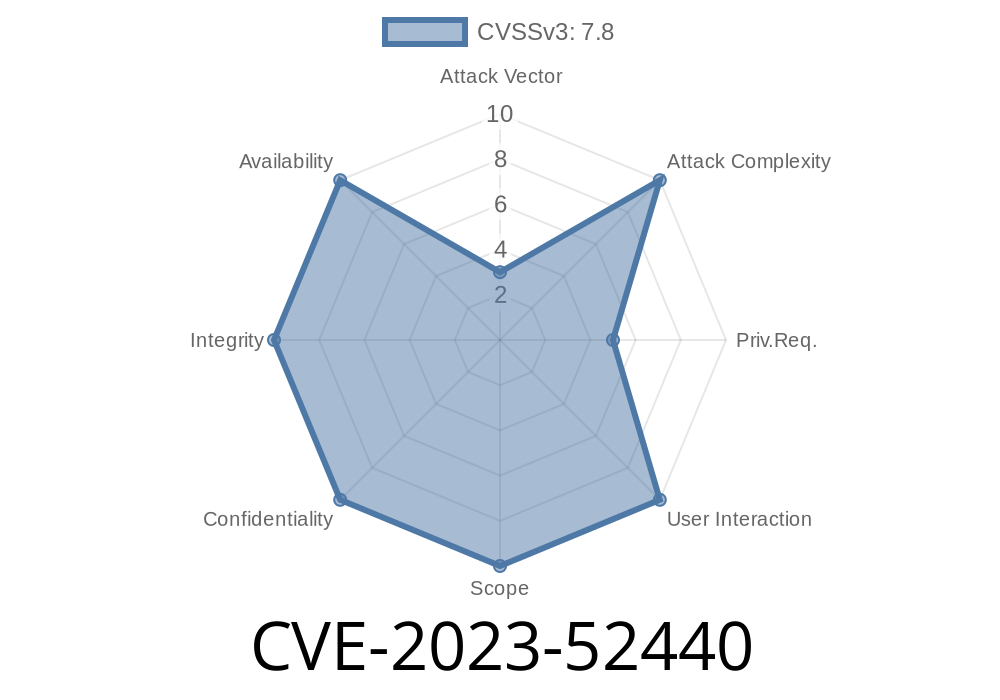In January 2024, a serious vulnerability was found and patched in the Linux kernel component ksmbd. The issue, filed as CVE-2023-52440, can cause a SLUB overflow—a kind of memory corruption—when processing malformed authentication data from clients. This bug could let remote attackers crash the system or even execute malicious code under the right circumstances. In this post, I’ll explain how this happens, show key code snippets, reference the original kernel patch, and walk through a hypothetical exploit scenario, all in plain, no-nonsense American English.
What Is ksmbd and Why Care?
ksmbd is a Linux kernel server that implements the SMB protocol, which is a network file sharing protocol (used in Windows networks). If your Linux server shares files with Windows machines, you might be running ksmbd.
Problems inside kernel network code like ksmbd are a big deal: any bug here can usually be triggered remotely, and buffer or heap overflows are favorite bugs for attackers to force a crash or run their own code.
The Vulnerability: SLUB Overflow in NTLMSSP Auth
The bug lives in the function ksmbd_decode_ntlmssp_auth_blob(). When a Windows client tries to log in, it often uses an authentication blob (the "NTLMSSP" auth protocol). Inside this blob is a SessionKey field with a Length property. ksmbd copies this SessionKey into a fixed-size buffer in memory during authentication.
Here is the mistake
- The code did not check if the SessionKey.Length reported by the client was bigger than the size of the local buffer (should be CIFS_KEY_SIZE, which is 16 bytes).
- If a malicious client puts, say, 64 in the Length field and sends 64 bytes, ksmbd copies all 64 bytes into a 16-byte buffer. Oops: the extra 48 bytes overwrite nearby operating system data—the so-called heap or "SLUB" memory.
The Vulnerable Code
Here's the relevant snippet from the Linux kernel commit:
// authblob->SessionKey.Length comes from the client!
memcpy(session->sesskey,
authblob->SessionKey.Buffer,
authblob->SessionKey.Length);
Proper fix
if (authblob->SessionKey.Length > CIFS_KEY_SIZE)
return -EINVAL; // Too long! Error out.
memcpy(session->sesskey,
authblob->SessionKey.Buffer,
authblob->SessionKey.Length);
Exploit: Proof-of-Concept
An attacker just needs to connect to a ksmbd server and send a malicious authentication packet with a too-big SessionKey. They can do this using existing SMB libraries, or even modify Impacket or smbclient.
Python POC Sketch
# Requires 'impacket'; for illustration only. Real exploit would be more involved!
from impacket.smbconnection import SMBConnection
target = '192.168.1.100'
port = 445
conn = SMBConnection(target, target, sess_port=port)
# Send a custom crafted NTLMSSP auth with SessionKey.Length set to 256
# You'll need to patch impacket or use a custom SMB library to send a bogus key length
# This triggers the overflow in vulnerable ksmbd servers
The real danger: if attackers know how memory is laid out in your kernel (maybe via info leak), they could use this to take control of the system, not just crash it.
How Was It Patched?
The full patch is at patchwork.kernel.org. It’s a simple but critical bounds check:
if (authblob->SessionKey.Length > CIFS_KEY_SIZE)
return -EINVAL;
Similarly, see mainline kernel commit.
Servers exposed to the Internet or unfriendly networks.
This bug is *specific* to ksmbd (in-kernel SMB server). If you use Samba user-space server (smbd), you are not affected!
How to Fix
- Upgrade your Linux kernel to a version with the patch (Jan 2024 or later). Distros should release updates soon.
- If you can, disable ksmbd or block SMB ports (445/tcp) from untrusted sources.
More Details and References
- CVE-2023-52440 NVD entry
- Linux Kernel Patch (Patchwork)
- ksmbd Documentation
- ksmbd source code
- Impacket (Python SMB library)
Conclusion
CVE-2023-52440 is a classic developer error—trusting a field from the network without checking its size before copying data—which can have major security consequences. If you run ksmbd on Linux, patch ASAP. This is the kind of bug attackers love: simple to trigger, remotely exploitable, and able to crash or compromise your server.
Stay updated, stay safe, and always validate buffer sizes.
*This post is exclusive and written in simple terms for quick understanding. For more hands-on analysis or a deeper dive into kernel security, keep following this blog!*
Timeline
Published on: 02/21/2024 08:15:45 UTC
Last modified on: 03/15/2024 13:44:59 UTC
